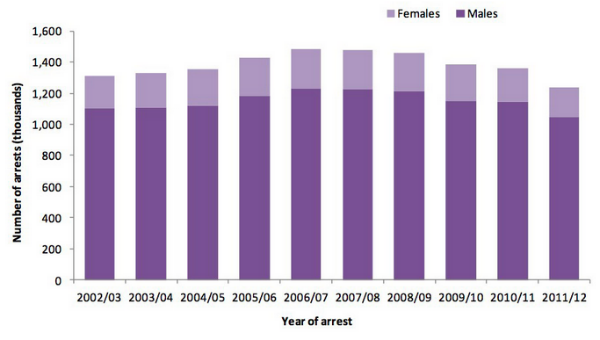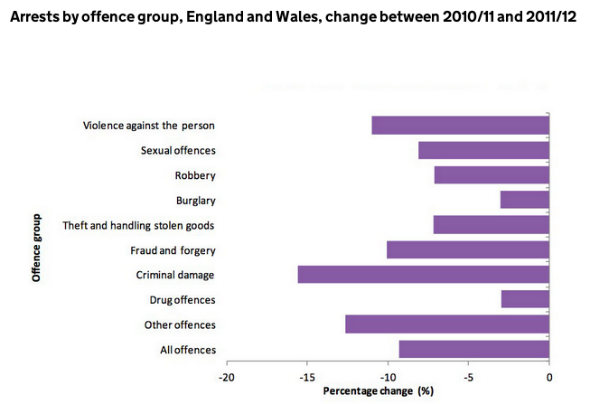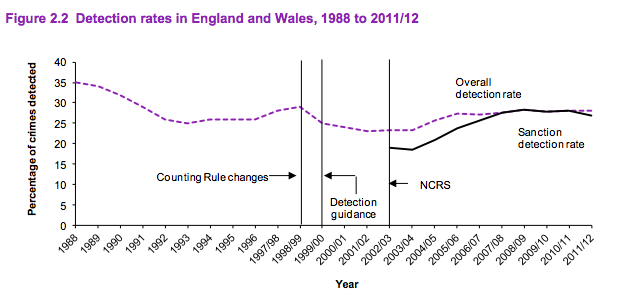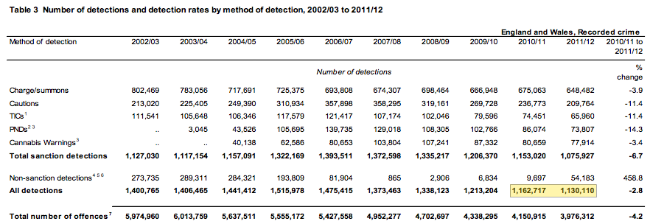Are fewer crimes being solved?
"For ten years while crime came down, we saw a higher proportion of crimes solved, and more offenders brought to justice. Yet now we are seeing the opposite. 200,000 fewer arrests. 30,000 fewer cases solved."
Yvette Cooper, Speech to the Police Federation Annual Conference, 16 May 2013
Is the fall in crime necessarily good news if fewer criminals are being brought to justice? In a speech at the annual Police Federation conference Shadow Home Secretary Yvette Cooper flagged the issue, adding that there had been a fall in the number of crimes solved. So is the view that crime is falling - and that this is good thing - a complete fallacy?
Are fewer people being arrested?
In short, yes. According to this year's report on police powers and procedures in England and Wales, there was a 9% decrease in the number of people arrested for notifiable offences between 2010/11 and 2011/12, from 1.4 million to 1.2 million. The number of recorded crimes decreased by 4% over the same period.
As we can see in the chart below, the number of individuals arrested has fallen for the fifth successive year. This was also the lowest number since the arrests data collection began (in 1999/00; 1.3 million persons).

As we can see below, fewer arrests happened in each of the nine offence groups. Crimes of violence against the person saw the biggest numerical reduction: down 47,422 arrests, or by 11%.

The obvious question we might ask is why arrests have fallen faster than recorded crimes have. The Home Office's statistical bulletin doesn't spell out the reason behind this drop, although the fall in the number of offences - from 4.1 million in 2010/11 to 3.9 million in the last year (see Table 3, page 229) - will account for at least part of it.
Why the fall in solved crime?
As we can see from the graph below - from the latest Home Office report on Crime in England and Wales - crime detection rates (the proportion of crimes 'solved') have fluctuated over the years, as a result of changes to the rules and guidance which tightened the circumstances in which a 'detection' could be made.

*NCRS = National Crime Recording Standard
So is Yvette Cooper right to claim that the number of solved cases has dropped? The figures in this Home Office table suggest that while 1.16 million crimes were solved in 2010/11, only 1.13 million were solved the following year. So it's true to say that 30,000 fewer crimes were solved in 2011/12.

However, since offences have also been falling we should really be interested in the detection rate. The year 2011/12 saw 200,000 fewer offences being recorded than in 2010/11, meaning that the detection rate has actually gone up slightly from 28% in 2010/11 to 28.4% in 2011/12.

What's significant about this is that although the overall detection rate has gone up, most categories of detection have actually gone down. Only non-sanction detections, which are a form of crime resolution in which the offender receives more lenient treatment (the sentence is cleared and they avoid a criminal record as well as going to court) have significantly risen.
In her speech Ms Cooper brought up the use of community resolutions, a new and alternative way of tackling minor crime, through which the offender avoids going to court if they agree to make amends to the victim by apologising, compensating them, or by repairing any damage. Ms Cooper says that:
"Officers have told me they've had to use Community Resolutions to write cases off — even when they know the crime is serious because they haven't the time and resources to follow it up."
We factchecked a similar claim earlier this month and found that there are a number of reasons behind the rise in non-sanction detections.
So it's not entirely fair to say that fewer crimes are being solved, as the overall detection rate is actually up given the fall in recorded crime. That said, a closer look at the numbers shows it's actually the increase in more lenient non-sanction detections that's causing a great proportion of crimes to be solved, so the Shadow Home Secretary does have a point.
Lastly, it's important to bear in mind that detection rates aren't necessarily the most useful measure for judging police performance. As we previously stated, there's a case for detection rates being affected by different policing tactics. In its statistical bulletin, the Home Office stresses that:
"Detection rates are not a direct measure of police investigative performance and need to be interpreted with care. For example, some of the offences with the highest detection rates are the offences most influenced, in terms of their recorded numbers, by proactive policing to apprehend offenders (for example, drug offences and many of the offences in the 'other offences' category)."
As we flagged in a previous factcheck, crime may be considered 'solved' even when a detection is not made, for example when the police are satisfied they know who the offender is but where a victim is unwilling to cooperate any further.
---
Flickr image courtesy of longestqskeleton